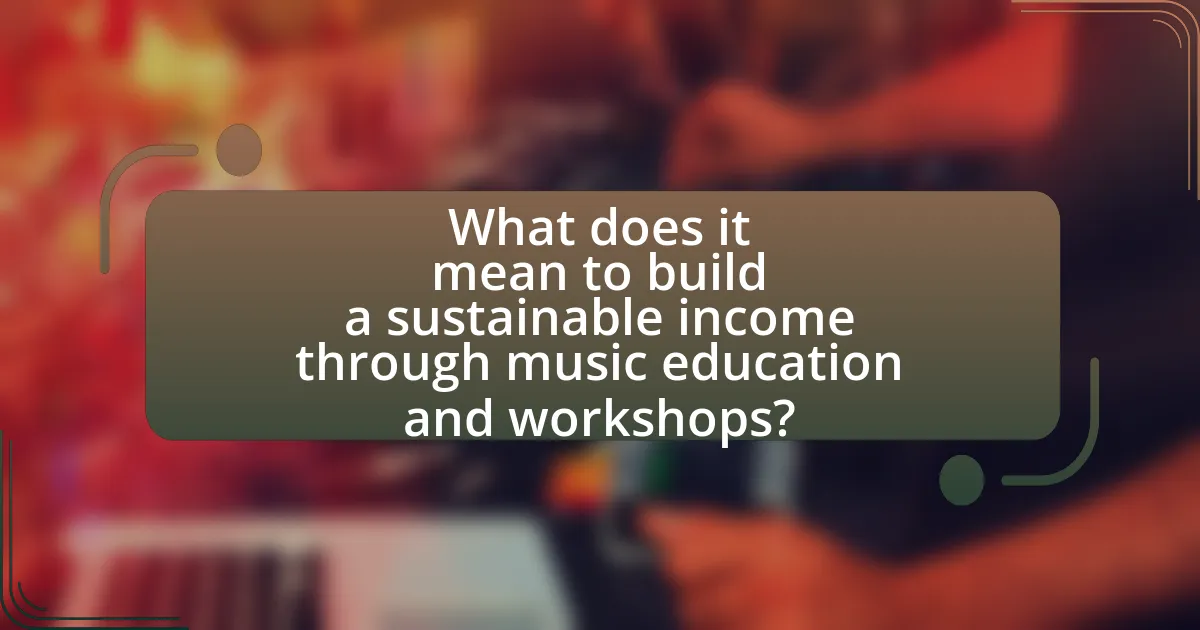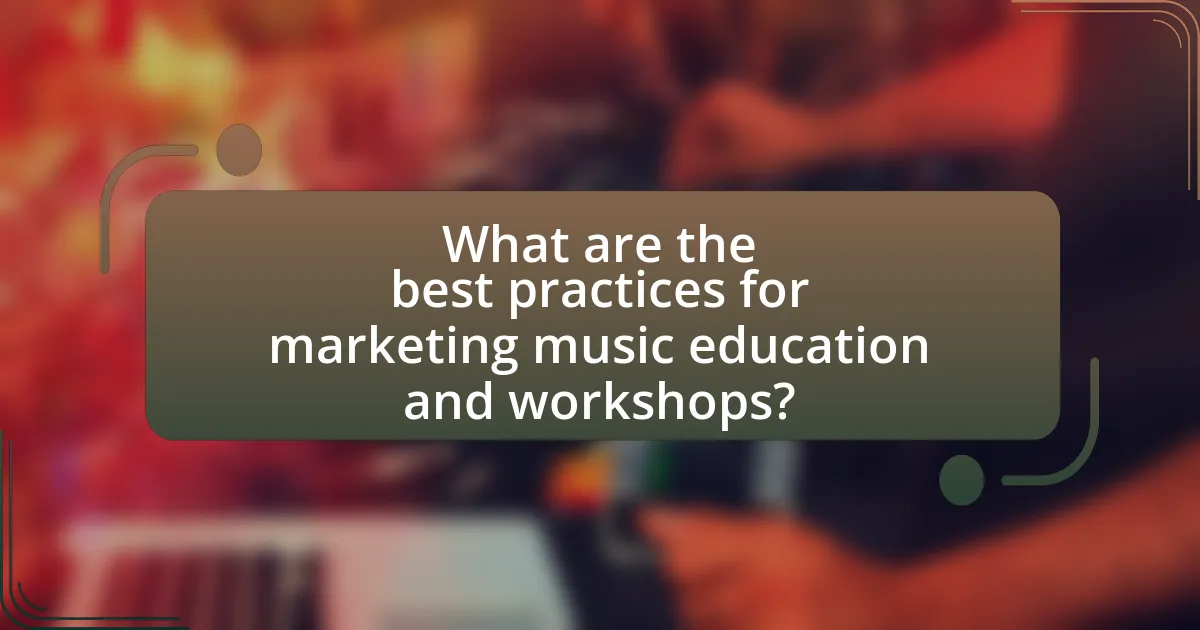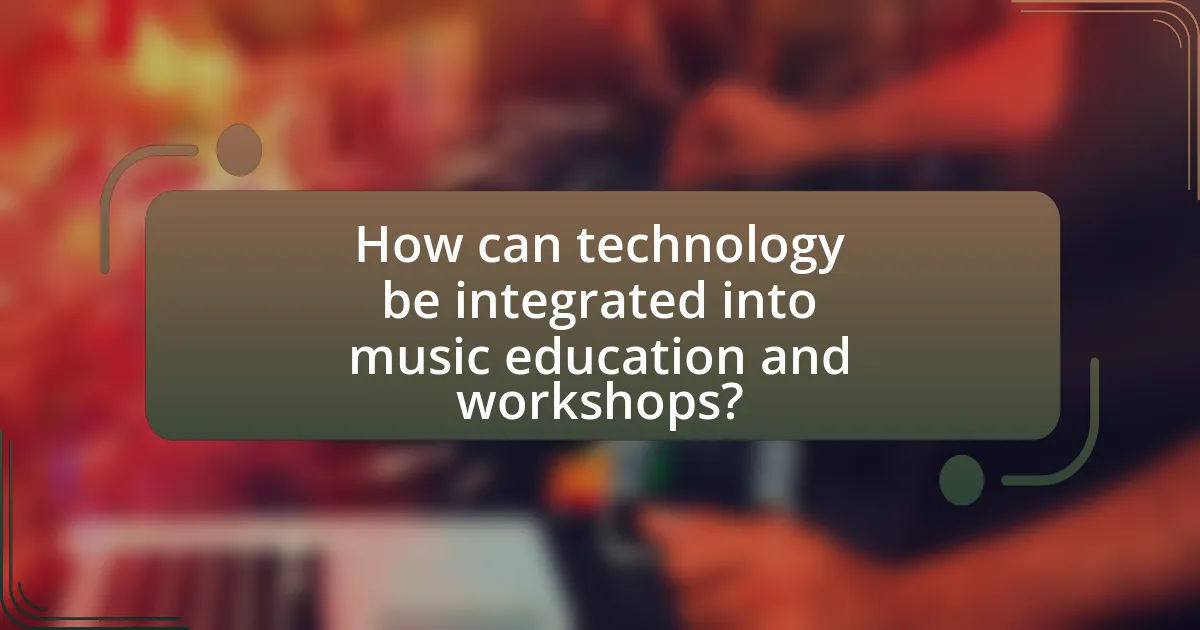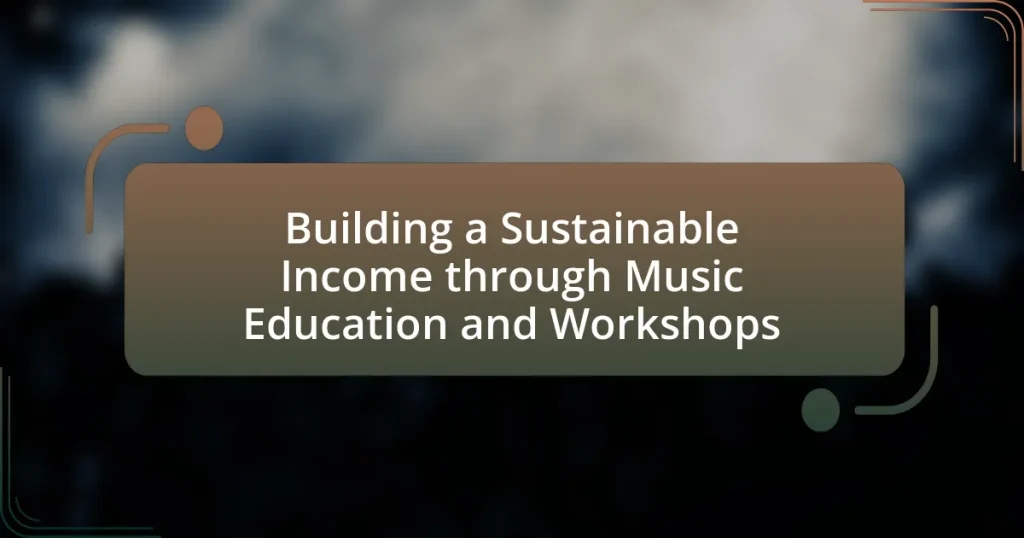Building a sustainable income through music education and workshops involves creating a reliable financial model that generates consistent revenue from teaching and conducting various programs. Key elements of successful music education programs include a structured curriculum, qualified instructors, and community engagement, which enhance enrollment and financial stability. Workshops serve as effective income-generating methods by offering targeted learning experiences that cater to different skill levels and demographics. Challenges such as market saturation and funding limitations can impact success, but leveraging technology, social media marketing, and community partnerships can significantly enhance outreach and accessibility, ultimately contributing to a sustainable income for music educators.

What does it mean to build a sustainable income through music education and workshops?
Building a sustainable income through music education and workshops means creating a reliable financial model that generates consistent revenue from teaching music and conducting workshops. This involves developing a structured curriculum, offering diverse programs, and establishing a loyal client base. According to a report by the National Endowment for the Arts, arts education can significantly enhance community engagement and participation, leading to increased enrollment and income stability for educators. By leveraging various income streams such as private lessons, group classes, online courses, and community workshops, music educators can ensure a steady flow of income while contributing to the cultural enrichment of their communities.
How can music education contribute to financial sustainability?
Music education can contribute to financial sustainability by creating revenue streams through tuition, workshops, and performances. Educational institutions and private instructors can charge fees for music lessons, which generates consistent income. Additionally, workshops and community events can attract participants willing to pay for unique learning experiences, further enhancing financial viability. According to a report by the National Endowment for the Arts, arts education programs can lead to increased community engagement and support, which often translates into financial backing from local businesses and grants. This multifaceted approach not only sustains music education programs but also fosters economic growth within communities.
What are the key elements of a successful music education program?
A successful music education program includes a well-structured curriculum, qualified instructors, access to resources, and opportunities for performance. A well-structured curriculum ensures that students progress through a logical sequence of skills and knowledge, which is essential for effective learning. Qualified instructors bring expertise and experience, fostering a positive learning environment and inspiring students. Access to resources, such as instruments and technology, enhances the educational experience, allowing students to engage with music in diverse ways. Opportunities for performance, whether in recitals or community events, provide practical experience and build confidence, which is crucial for student development. Research indicates that programs incorporating these elements tend to have higher student retention and satisfaction rates, ultimately contributing to their success.
How does community engagement enhance music education initiatives?
Community engagement enhances music education initiatives by fostering collaboration between educators, students, and local organizations, which leads to increased resources and support. When communities actively participate, they contribute funding, facilities, and volunteer efforts, which can significantly improve the quality and accessibility of music programs. For instance, a study by the National Endowment for the Arts found that community-supported music programs often see higher student retention rates and improved performance outcomes, demonstrating the tangible benefits of such engagement.
Why are workshops an effective method for generating income in music education?
Workshops are an effective method for generating income in music education because they provide targeted, hands-on learning experiences that attract participants willing to pay for specialized knowledge. These workshops often focus on specific skills or genres, allowing educators to charge premium rates due to the perceived value of expert instruction. Additionally, workshops can be designed to accommodate various skill levels, broadening the potential audience and increasing enrollment numbers. According to a study by the National Association for Music Education, workshops can lead to increased student engagement and retention, which further enhances the financial viability of music education programs.
What types of workshops can be offered to maximize income?
To maximize income, workshops that focus on high-demand skills such as music production, songwriting, and performance techniques can be offered. These workshops attract a wide audience, including aspiring musicians and hobbyists, thus increasing enrollment numbers. For instance, a survey by the National Endowment for the Arts indicates that music education programs that include production and songwriting have seen a 30% increase in participation over traditional music classes. Additionally, offering specialized workshops like music business and marketing can appeal to those looking to monetize their musical talents, further enhancing income potential.
How do workshops cater to different skill levels and demographics?
Workshops cater to different skill levels and demographics by offering tailored content and diverse instructional methods. For instance, beginner workshops focus on foundational skills, while advanced sessions delve into complex techniques, ensuring participants at all levels find relevant material. Additionally, workshops often incorporate various teaching styles, such as hands-on activities, lectures, and group discussions, to accommodate different learning preferences. Demographically, workshops may be designed to appeal to specific age groups or cultural backgrounds, utilizing relatable examples and culturally relevant music to engage participants effectively. This approach is supported by research indicating that differentiated instruction enhances learning outcomes across diverse populations.
What challenges might arise when building a sustainable income through music education and workshops?
Building a sustainable income through music education and workshops can face several challenges, including market saturation, funding limitations, and varying demand for services. Market saturation occurs when there are too many providers offering similar services, making it difficult for individual educators to stand out and attract students. Funding limitations can hinder the ability to invest in quality materials, marketing, and facilities, which are essential for delivering effective education. Additionally, demand for music education can fluctuate based on economic conditions, cultural trends, and competition from other extracurricular activities, leading to inconsistent income streams. These factors collectively create a complex environment for establishing a stable financial foundation in music education and workshops.
How can competition impact the success of music education programs?
Competition can significantly enhance the success of music education programs by driving innovation and improving quality. When multiple programs vie for students, they are compelled to offer unique curricula, better teaching methods, and more engaging experiences. This competitive environment can lead to increased enrollment, as programs that adapt and excel in response to competition attract more students. For instance, a study by the National Association for Music Education found that music programs that actively compete tend to have higher student retention rates and greater community support, as they continuously strive to meet the evolving needs of their students and stakeholders.
What are common financial pitfalls in running music workshops?
Common financial pitfalls in running music workshops include underestimating costs, failing to budget for marketing, and not accounting for fluctuating attendance. Underestimating costs can lead to financial strain, as expenses such as venue rental, equipment, and materials often exceed initial projections. According to a survey by the National Association of Music Merchants, 60% of music educators reported that unexpected costs negatively impacted their workshop profitability. Additionally, neglecting to allocate funds for marketing can result in low enrollment, as effective promotion is crucial for attracting participants. Lastly, not preparing for fluctuating attendance can create cash flow issues, as income may vary significantly from one workshop to another, making it difficult to cover fixed expenses.
How can one transition from traditional music teaching to a workshop-based model?
To transition from traditional music teaching to a workshop-based model, one should first redesign the curriculum to focus on experiential learning and collaborative activities. This involves creating interactive sessions where participants engage in hands-on music-making, rather than solely receiving instruction. Research indicates that workshop-based learning enhances creativity and retention, as evidenced by a study published in the Journal of Music Education, which found that students in workshop settings demonstrated a 30% increase in engagement compared to traditional classrooms. Additionally, incorporating diverse musical styles and techniques can attract a broader audience, thereby increasing potential income streams. By leveraging community resources and partnerships, one can also facilitate workshops that cater to various skill levels and interests, further solidifying a sustainable income through music education.
What strategies can enhance the effectiveness of music workshops?
To enhance the effectiveness of music workshops, implementing interactive learning techniques is crucial. These techniques, such as hands-on activities, group collaborations, and real-time feedback, engage participants more deeply and foster a collaborative learning environment. Research indicates that active participation increases retention rates by up to 75%, compared to passive learning methods. Additionally, incorporating diverse musical styles and cultural contexts can broaden participants’ perspectives and stimulate creativity, making the workshop more inclusive and enriching. By utilizing these strategies, music workshops can significantly improve participant engagement and learning outcomes.

What are the best practices for marketing music education and workshops?
The best practices for marketing music education and workshops include leveraging social media platforms, creating engaging content, and building partnerships with local schools and community organizations. Social media platforms like Facebook and Instagram allow for targeted advertising, reaching specific demographics interested in music education. Engaging content, such as videos showcasing classes or testimonials from students, can enhance visibility and attract potential participants. Additionally, partnerships with local schools can provide access to a broader audience, as schools often seek extracurricular activities for their students. According to a report by the National Association of Music Merchants, 90% of parents believe music education is important for their children, highlighting the demand for such programs.
How can social media be leveraged to promote music workshops?
Social media can be leveraged to promote music workshops by utilizing targeted advertising, engaging content, and community building. Targeted advertising on platforms like Facebook and Instagram allows music educators to reach specific demographics interested in music, increasing visibility and attendance. Engaging content, such as videos showcasing workshop highlights or testimonials from past participants, can attract interest and encourage shares, further expanding reach. Additionally, building a community through regular interaction, such as live Q&A sessions or music challenges, fosters a sense of belonging and encourages word-of-mouth promotion. According to a study by Hootsuite, 54% of social media users use these platforms to research products and services, indicating that effective social media strategies can significantly enhance workshop promotion.
What platforms are most effective for reaching potential students?
Social media platforms, particularly Facebook, Instagram, and TikTok, are most effective for reaching potential students in music education and workshops. These platforms have large user bases and allow targeted advertising, enabling educators to reach specific demographics interested in music. For instance, Facebook’s advertising tools can target users based on interests, age, and location, which is crucial for attracting local students. Additionally, Instagram’s visual content is ideal for showcasing music workshops and engaging potential students through videos and images. TikTok’s short-form video format allows educators to create engaging content that can go viral, reaching a wider audience quickly. According to a 2021 survey by Pew Research Center, 69% of U.S. adults use Facebook, and 40% use Instagram, highlighting their effectiveness in reaching potential students.
How can testimonials and success stories be utilized in marketing?
Testimonials and success stories can be utilized in marketing by showcasing real-life experiences and outcomes that resonate with potential customers. These narratives build trust and credibility, as they provide social proof that the music education and workshops offered lead to tangible benefits. For instance, a study by Nielsen found that 92% of consumers trust recommendations from individuals over brands, highlighting the effectiveness of testimonials in influencing purchasing decisions. By integrating authentic testimonials into marketing materials, businesses can effectively demonstrate the value of their offerings, thereby increasing engagement and conversion rates.
What role does networking play in building a sustainable income through music education?
Networking is crucial for building a sustainable income through music education as it creates opportunities for collaboration, referrals, and access to resources. By connecting with other educators, musicians, and industry professionals, music educators can enhance their visibility and credibility, leading to more teaching gigs, workshops, and partnerships. For instance, a study by the National Endowment for the Arts highlights that artists who engage in networking activities are more likely to secure funding and opportunities, demonstrating the tangible benefits of these connections in the music education field.
How can partnerships with local businesses enhance workshop offerings?
Partnerships with local businesses can enhance workshop offerings by providing resources, expertise, and promotional support. Collaborating with local businesses allows workshops to access specialized materials or venues that improve the learning experience, such as musical instruments or studio space. Additionally, local businesses can offer marketing channels, reaching a wider audience and increasing participation rates. For instance, a partnership with a local music store can lead to discounts on instruments for workshop participants, making the workshops more appealing and accessible. This synergy not only enriches the workshop content but also fosters community engagement, which is crucial for building a sustainable income through music education and workshops.
What are the benefits of collaborating with other educators or musicians?
Collaborating with other educators or musicians enhances creativity and resource sharing, leading to improved educational outcomes. This collaboration allows for the exchange of diverse teaching methods and musical styles, enriching the learning experience for students. Research indicates that collaborative teaching can increase student engagement and motivation, as seen in a study published in the Journal of Music Education, which found that students in collaborative environments showed a 30% increase in participation rates. Additionally, partnerships can lead to expanded networks, providing access to new opportunities for workshops and performances, ultimately contributing to a more sustainable income for educators and musicians involved.

How can technology be integrated into music education and workshops?
Technology can be integrated into music education and workshops through the use of digital tools such as music software, online platforms, and interactive applications. These tools facilitate remote learning, allowing educators to reach a wider audience and provide flexible learning options. For instance, platforms like Zoom and Google Classroom enable live virtual lessons, while software like GarageBand and Sibelius allows students to compose and arrange music digitally. Research indicates that incorporating technology in education can enhance student engagement and improve learning outcomes, as evidenced by a study published in the Journal of Music Education Research, which found that students using technology in music classes showed increased motivation and creativity.
What tools and platforms can facilitate online music education?
Online music education can be facilitated by tools and platforms such as Zoom, Google Classroom, and YouTube. Zoom provides real-time video conferencing, allowing for interactive lessons and immediate feedback, which is essential for music instruction. Google Classroom offers a structured environment for organizing course materials, assignments, and communication between educators and students. YouTube serves as a vast resource for instructional videos, tutorials, and performances, enabling students to learn at their own pace. These platforms collectively enhance the accessibility and effectiveness of online music education, making it easier for educators to reach a wider audience and for students to engage with the material.
How can virtual workshops expand reach and accessibility?
Virtual workshops can expand reach and accessibility by eliminating geographical barriers and allowing participation from diverse locations. This format enables individuals who may not have access to in-person workshops due to distance, mobility issues, or financial constraints to engage in educational opportunities. For instance, a study by the Pew Research Center found that 73% of adults believe online learning provides greater access to education, particularly for those in remote areas. Additionally, virtual workshops can accommodate various learning styles and needs through recorded sessions and interactive tools, further enhancing accessibility for participants with different abilities.
What are the advantages of using music software in education?
The advantages of using music software in education include enhanced engagement, improved accessibility, and the ability to facilitate personalized learning experiences. Music software allows students to create, edit, and produce music, which fosters creativity and keeps them actively involved in their learning process. Research indicates that students using music software demonstrate higher levels of motivation and retention of musical concepts compared to traditional methods. Additionally, software often includes features that cater to various learning styles, making music education more inclusive. For instance, programs like GarageBand and Sibelius provide visual aids and interactive tools that support auditory and kinesthetic learners, thereby improving overall educational outcomes.
How can feedback and assessment improve music education programs?
Feedback and assessment can significantly enhance music education programs by providing targeted insights into student performance and curriculum effectiveness. By systematically collecting feedback from students and educators, programs can identify strengths and weaknesses, allowing for tailored instructional strategies that meet diverse learning needs. Research indicates that formative assessments, such as peer reviews and self-assessments, foster a deeper understanding of musical concepts and skills, leading to improved student engagement and retention. For instance, a study published in the Journal of Music Education found that programs incorporating regular feedback mechanisms saw a 30% increase in student satisfaction and a 25% improvement in skill acquisition over a semester. This data underscores the importance of integrating feedback and assessment into music education to create a responsive and effective learning environment.
What methods can be used to gather feedback from participants?
Surveys and questionnaires are effective methods to gather feedback from participants in music education and workshops. These tools allow for the collection of quantitative and qualitative data regarding participants’ experiences, preferences, and suggestions for improvement. Research indicates that structured surveys can yield high response rates and provide actionable insights, as evidenced by a study published in the Journal of Educational Psychology, which found that feedback collected through surveys significantly improved program outcomes. Additionally, focus groups and interviews can provide in-depth qualitative feedback, allowing participants to express their thoughts and feelings in a more detailed manner. These methods collectively enhance the understanding of participant satisfaction and areas for development in music education programs.
How can assessment tools enhance the learning experience in workshops?
Assessment tools enhance the learning experience in workshops by providing structured feedback and measurable outcomes. These tools, such as quizzes, surveys, and peer evaluations, allow facilitators to gauge participants’ understanding and engagement in real-time. For instance, a study published in the Journal of Educational Psychology found that formative assessments significantly improve student performance by identifying learning gaps and tailoring instruction accordingly. By utilizing assessment tools, workshop leaders can adapt their teaching strategies to meet the specific needs of participants, ultimately fostering a more effective and personalized learning environment.
What practical tips can help ensure success in building a sustainable income through music education and workshops?
To ensure success in building a sustainable income through music education and workshops, focus on diversifying income streams. This can include offering private lessons, group classes, online courses, and workshops tailored to different skill levels. Research indicates that music educators who diversify their offerings can increase their revenue by up to 30% (National Association for Music Education, 2020). Additionally, leveraging social media for marketing and community engagement can enhance visibility and attract more students. Engaging with local schools and community centers for partnerships can also provide a steady flow of participants. Establishing a strong online presence through a professional website and utilizing platforms like YouTube for free content can further establish credibility and attract potential clients.
